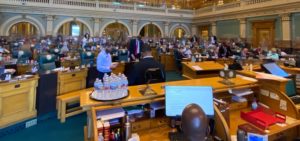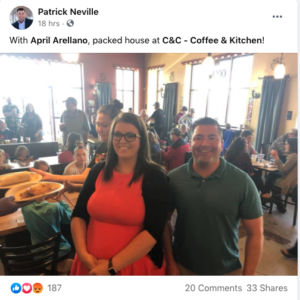 May 26, 2020 01:31 PM UTC
May 26, 2020 01:31 PM UTC

The Colorado legislature re-convened today after a two month coronavirus break, with the main item on the agenda the constitutionally-mandated passage of a balanced state budget. We’ve heard a lot about the gut-wrenching decisions being made by Colorado’s Joint Budget Committee, but not much about how Republican lawmakers are planning to operate in these final weeks of the legislative session.
House Minority Leader Patrick Neville outlined the Republican “plan” for tackling important issues at the State Capitol in an Op-Ed for the publication formerly known as the Colorado Statesman. We mentioned one of Neville’s points earlier, but with much uncertainty regarding how Republicans plan to work with Democrats in the state legislature, we thought it valuable to run through Neville’s entire proposal.
On Tuesday, May 26, we return to the Gold Dome to tackle one critical task: our state budget. Colorado is facing a $3 billion-plus shortfall. Because of that we will have to make unprecedented spending cuts to keep the state afloat. However, we can not just leave it there. COVID-19 has taught us that we have more to address.
Legislative leaders have already made it clear that this is not the time to push forward a bunch of new bills when the legislature must finalize a couple of constitutionally-mandated priorities, such as balancing the budget. Neville knows this, but why start out honestly when you can just dive into the partisan muck?
Governor Polis has demonstrated that we have given the executive branch far too much emergency power. Governor Polis has abused his power by picking winners and losers among businesses and industries, shutting down small businesses like C&C Kitchen and letting larger ones remain open.
Governor Polis only allowed his favorite restaurants to remain open during the pandemic! It almost sounds like the governor singled out only the restaurants where Rep. Neville likes to eat. Not only is this untrue, the very premise is just plain stupid. But, here we are…
The legislature must take back power from the executive and curb these emergency powers. The next time our state faces a crisis like this, the Governor cannot have the unlimited power that Governor Polis is privileged to have today.
If you’re waiting for the explanation for how this proposal would work, you’ll want to get comfortable. This entire Op-Ed, much like the general strategy of legislative Republicans for the next three weeks, is to voice clear opposition to everything without proposing even a barebones outline of how to do something different.
My colleagues on the other side of the aisle are quick to blame the Taxpayer Bill of Rights (TABOR) for our budgetary problems. Let me be clear, it is the years and years of massive Democrat spending that has put our state in a bind, not TABOR. Without TABOR, we would be in a far worse situation, where rampant spending is the virus and debt is the symptom.
What you see here is one of the fundamental complexities of being a full-throated TABOR supporter. You can’t simultaneously say that TABOR works to constrain the state budget AND THEN ARGUE that TABOR is not responsible for constraining the state budget.
Intellectually dishonest? CHECK. Logically inconsistent? CHECK.
That last part is also important: Neville says that “spending” is the virus and “debt” is the symptom. Ignoring the fact that real people are dying from an actual virus and not a metaphorical virus, this point is a common conflation between TABOR and balancing a budget. Colorado would be a balanced budget state with or without TABOR. We’re not the federal government.
The public should know that since 2016-17, the Colorado State budget has increased 24% and General Fund revenues have gone up 25%. Yet in this same timespan state population has grown a relatively modest 4%.
If you believe Colorado has kept up with population growth and inflation, then you probably don’t have kids in public schools or have somehow managed to avoid driving on roads. The percentages cited here appear to be exaggerations at best, but the numbers only mean something to you if you have decided not to pay attention to the world around you.

Focusing on the last three years in Colorado ignores that the state’s General Fund has largely fallen below population growth numbers (as measured in dollars per person) since TABOR passed in 1992. This is the only timeline that matters in the real world, and it also happens to include two previous big budget crises that we still haven’t fully recovered from.
And we’ll repeat this point for every new generation of conservative budget crunchers: Don’t ever quote the total budget state budget when it is propped up by federal funding like Medicaid that is not under state lawmaker’s control.
We can slow — and ultimately our workforce will reverse — the financial crisis, but to do that, we have to speed up the reopening of Colorado. By all metrics, Colorado is on the back end of the pandemic.
What metrics? Does the coronavirus know that we are on “the back end of the pandemic?” That Neville believes the pandemic is almost over probably tells you everything you need to know about his advice going forward.
The areas that remain affected are dense urban populations such as Denver and Boulder. There is no reason to treat the rest of Colorado the same.
This is patently false, as we discussed earlier.
Coloradans are ready to return to work. They need to be able to earn a living and provide for their loved ones. As long as we remain shutdown, we hurt those most in need.
This is not what the majority of Coloradans actually believe. Polls have consistently shown that Coloradans and people across the country are wary of a quick return back to a pre-coronavirus “normalcy.” This poll, conducted last month by Republican polling outfit Magellan Strategies, says exactly the opposite of what Neville would have you believe. As The Denver Post reported: “The results showed 64% of respondents said they preferred a policy aimed at slowing the spread of the coronavirus until more widespread testing becomes available, ‘even if that meant many businesses will have to stay closed.’”
If you don’t address health concerns first — and make people more comfortable entering stores and restaurants — then it doesn’t matter how big you make your “NOW OPEN” sign.
The Federal Government’s Stimulus package (the CARES Act) provides Colorado with over $2.2 billion dollars to soften the blow to Colorado’s economy.
If your plan is to say, “Don’t worry, the federal government will save us,” then you’ve apparently not been paying attention to anything over the last couple of months.
Most of the CARES Act money was allocated to local school districts. By virtue of having a population greater than 500,000, the City of Denver was the ONLY municipal government in Colorado to receive federal assistance funding. As Neville surely knows, the big battle in Congress at the moment is about how much additional federal funding will be made available to local and state governments to slow furloughs and layoffs. The bottom line here is that Colorado is in no way, shape, or form receiving enough federal stimulus money to prevent massive cuts to the state budget created by the coronavirus pandemic.
It is the job of the legislature to make our spending priorities clear. We must help the people who have been hurt most. Small businesses that have been forced to shut down by Governor Polis are still on the hook for business personal property tax, and they deserve a refund for that money lost.
Yes, Governor Polis shut down small businesses because he hates them. That’s what happened.
Neville offers his only whiff of an actual policy proposal here: Refund money that businesses spent on the business personal property tax. Of course, this proposal would increase the already massive hole in the state budget, so how would Neville offset this loss?
[crickets]
We also have a duty to maintain the senior property tax exemption. Colorado’s senior citizens, the most vulnerable population to the virus, will be more vulnerable if faced with the threat of losing their homes without this exemption.
Nobody ever wants to make cuts to the senior property tax exemption, but this exemption has now been targeted by two separate administrations from both parties in two different recessions for an inescapable reason. If your plan is to deal with a $3.3 billion budget shortfall without touching the homestead exemption, then it’s on you to explain how you’re going to cut hundred of millions of dollars from something other than public school funding.
So, what should we cut instead?
[crickets]
The CARES Act funding also gives us the capability to replenish our unemployment reserves (normally paid by businesses), which have been completely drained with over 80,000 Coloradans now on unemployment.
Say what? Colorado might be able to refill some of its unemployment reserves with CARES Act funding, but we’re talking mostly about drops in buckets here. Regardless, eventually someone’s going to notice that the House GOP is allocating the same pot of money over and over and over again.
If we’re saying that a finite amount of COVID relief that’s already been spoken for should go to the unemployment fund, then that means (again) you’re going to need to cut more money from somewhere else in the budget. Remember that stimulus check you received from the federal government? Did it cover all of your expenses? Of course not.
If Congress wants to keep these unemployment funds afloat, that’s entirely within their power and should be included in the next round of stimulus talks — but that’s a hypothetical question at this point. Otherwise states are going to be borrowing money to backfill their unemployment funds or will just stop paying benefits altogether.
But underneath this argument is this assumption that the pandemic is over. It’s nowhere near over. Everything that’s been done so far is just keeping the country treading water.
We can and must accomplish these goals without raising taxes, without creating new fees, and without eliminating TABOR.
Great. How?

No, seriously: HOW can you “accomplish these goals without raising taxes, without creating new fees, and without eliminating TABOR?” All suggestions welcome.
[crickets]
To do this, we have to act quickly and decisively. We have to open Colorado as soon as possible.
Oh, here it is. Neville, who was famously photographed sans mask at a Castle Rock eatery in defiance of public health orders, has obligated his party to support reopening everything without regard to the health risks. The costs of opening without the pandemic under control? Not considered here. What happens to the economy if we have another COVID-19 surge?
[crickets]
Equally important, we have to put an end to the sort of Democrat pet projects that have drained Colorado of its reserves.
The first things getting cut by the legislature’s Joint Budget Committee are new programs approved in 2019 and 2020. This has been well-documented. You’ll need a new talking point here.
It is time to look to the future to make sure that the aftermath of COVID-19 is not worse than the current turmoil we are experiencing. Open Colorado.
Yes! Yes!!! Make the future better than the present! On this we all agree.
Subscribe to our monthly newsletter to stay in the loop with regular updates!
Comments